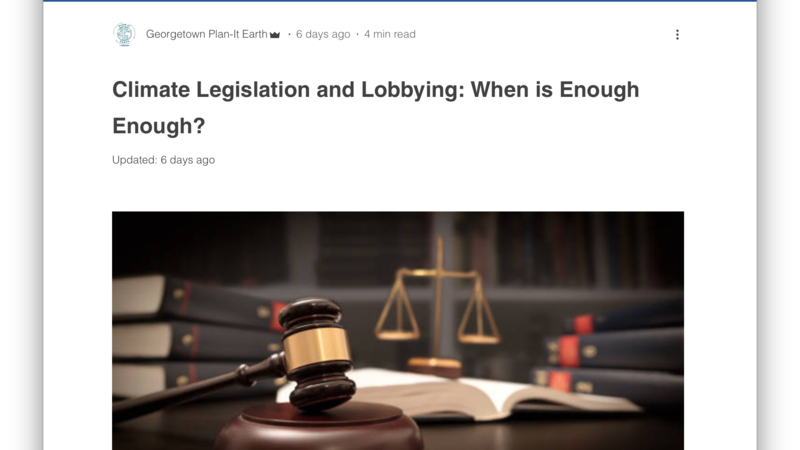
Read the full article on Georgetown University's Plan-It Earth website »
According to the Union of Concerned Scientists in the United States (UCSUSA), in 2018, the US ranked second in the world in carbon dioxide emissions into the atmosphere. The nation emitted 5.41 gigatonnes (GT) in the year alone. The nation continues to emit carbon dioxide and toxic gases including nitrous oxide and carbon monoxide, both of which can cause adverse health effects if exposed to for longer periods of time or to higher concentrations. Despite the known consequences of different toxins in the air and the nonrenewable energy companies’ contributions to rising national temperatures, it seems that the US Federal Government is unable to enact effective laws combating such continuous and uncontrolled emissions. Why is this the case?
The answer lies within the competition between nonrenewable energy companies and renewable energy companies.
Although climate change policies are debated upon by government officials, the officials are, in reality, representatives of the different energy companies or an energy sector as a whole. Energy companies in the US dictate many of the policies created and debated upon in the government through direct and indirect influences. Of the main influences, lobbying is the most prominent. Lobbying is the process of advocating for an idea with the intention of influencing others’ beliefs. In the US government, this is done by energy lobby groups paying large amounts of money to government officials including congresspersons and senators to advocate the groups’ ideas as their own.
Energy companies lobby extensively, and in the years 2000-2016, over $2 billion was spent on lobbying climate legislation, according to environmental sociologist Robert Brulle from Drexel University. This process is sustainable as the interest groups are able to see results. These results are a feature of the contribution-inequality by the two energy sectors. From the $2 billion total, the nonrenewable energy sector outspent environmental advocates 10:1. This serves to explain why the government is unable to pass effective climate change legislation. Environmental advocates have proposed numerous, effective methods of combating climate change by reducing air pollution; these methods include emission taxes and tradable permits. Emission taxes are taxes companies have to pay if they continue to emit pollutants into the atmosphere above a certain level, while the tradable permit system consists of companies buying and trading permits in order to pass the maximum amount of pollutant emissions allowed. The closest the renewable energy sector has been to passing effective legislation was the American Clean Energy and Security Act, also known as the Waxman-Markey act, in 2009. This act proposed the implementation of the tradable permit system as passed in the House of Representatives (which consisted of a Democratic majority) but was unable to reach the Senate (which consisted of a Republican majority). A study conducted by researchers at the University of Chicago and the University of Santa Barbara found that the act was associated with the most climate-related lobbying in the 2000-2016 period, and that the lobbying expenditures resulted in a 13-point decrease in the likelihood of the bill’s enactment, demonstrating the immense influence the process of lobbying has upon the Federal Government.
What impact may this lobbying have around the world?
The United States is one of the most influential nations in the world, and actions taken by the government are seen by other nations. Had the energy sector as a whole been eager to combat rising temperatures and helped pass certain acts that did so, other countries may have been able to prioritize rising temperatures in their agendas. However, this is not the case.
European countries such as Sweden have become more environmentally conscious and friendly, and have been, to some extent, inspiring other countries to recognize climate change as a dire issue. If the US were able to combat the extreme influence of lobbying, they could accelerate or even lead this initiative, inspiring other nations to join them and bring the increase in temperatures to a slower or constant rate.
However, combating lobbying is not simple and comes with many unforeseen implications. Banning lobbying altogether may lead to shadow lobbying, or illegal lobbying, as companies will likely still want their ideas and beliefs to be represented in the Federal Government. Therefore, the US must create a safe and manageable system where energy companies do not exercise such power, and instead work together to acknowledge their contributions to emissions and find ways to alleviate the effects their businesses have on the planet. Both energy sectors must financially analyze circumstances and lobby or advocate for a gradual shift towards greener alternatives, as drastic changes may result in negatively impacting the economy. By incorporating different views, a more permanent and applicable solution can be devised.
Then can the process of achieving a green United States of America begin.
---------------
Riya Pant a junior at ASD. She is passionate about STEM research and service opportunities, and hopes to combine these passions to positively impact the world in the future. She hopes that through her article readers will understand the dire need to revisit the political system in the US before climate change effects are irreversible. Aside from research and STEM, Riya enjoys martial arts, playing and listening to music, and spending time with her family.
Plan-It Earth is an annual ideathon at Georgetown University that brings together sustainability students, experts, and practitioners to generate solutions to critical environmental challenges.
- Student
- Sustainability



